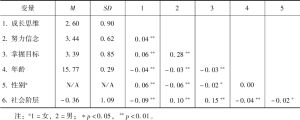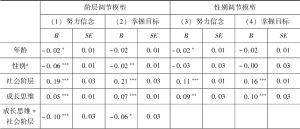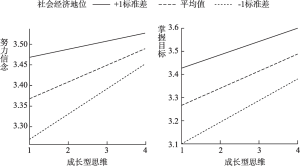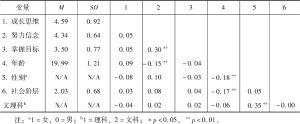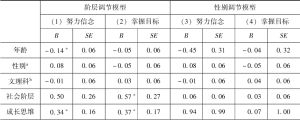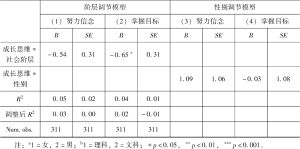章节
努力的意义:基于中国学生成长思维与成就动机的阶层分析
摘要
努力奋斗是个体的道德义务,也是低阶层改变命运的道德动力。本研究基于国际学生评估项目(PISA)中国中学生样本(n=12058)及某市大学生群体(n=311),探讨了成长思维——相信人的能力可以后天改变,而非先天固定不变的思维模式——的阶层差异,及其与成就动机的关系。结果发现,低阶层学生成长思维与高阶层学生相当;成长思维对努力信念、掌握目标等成就动机指标具有显著的正向预测效应,且阶层在二者之间起调节作用,即相对于高阶层,低阶层学生成长思维对成就动机的预测效应更大。总之,成长思维有助于提升成就动机,是低阶层学生的重要心理资源,有助于减少成就动机的阶层差异。本研究对打破能力的天资伦、重新定义低阶层努力的道德价值具有重要理论和现实意义,也对教育实践和阶层治理具有重要启发。
作者
茅云云 ,厦门大学社会与人类学院博士研究生。
周婵 ,北京体育大学教育学院讲师、硕士生导师。
吴胜涛 ,博士,厦门大学社会与人类学院副教授、博士生导师。本科毕业于北京师范大学哲学系,中国科学院心理研究所博士。研究兴趣包括社会文化变迁与心理适应,正义与社会规范,大数据分析等。国际跨文化心理学会、国际正义研究学会、亚洲社会心理学会会员,中国心理学会心理学与社会治理专业委员会、文化心理学专业委员会理事,中国社会学会社会心理学专业委员会理事,中国社会心理学会网络与大数据专业委员会理事。在Journal of Personality、International Journal of Psychology、Social Justice Research、《科学通报》、《中国科学院院刊》等期刊上发表学术论文40余篇。《心理学学科发展报告》(2016-2017)道德心理学部分执笔人。
电子信箱:michaelstwu@xmu.edu.cn或wust2011@163.com。
检索正文关键字
章节目录
-
一 引言
- (一)努力的道德意义
- (二)成长思维与成就动机
- (三)成长思维的阶层差异
- (四)研究问题与假设
-
二 研究1:来自国际学生评估项目(PISA)的证据
- (一)研究方法
- 1.数据来源
- 2.研究材料
- (二)结果
- 1.成长思维与成就动机的相关分析
- 2.社会阶层在成长思维与成就动机之间的调节作用
- (三)讨论
- (一)研究方法
-
三 研究2:关于某市大学生群体的研究
- (一)研究方法
- 1.被试
- 2.研究材料
- (二)结果
- 1.成长思维与成就动机的相关分析
- 2.社会阶层在成长思维与成就动机间的调节作用
- (三)讨论
- (一)研究方法
- 四 综合讨论
查看更多>>>


